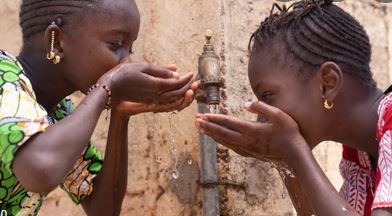COP26: Impacts of climate change in Africa

Climate changes have led to extensive flooding across many parts of Africa. Consequently, there have been considerable loss of lives or displacement of populations in different countries such as Sudan, Ethiopia, Somalia, Kenya, Uganda, Chad, Nigeria, Niger, Benin, Togo, Senegal, Cote d’Ivoire, Cameroon, and Burkina Faso. The 26th session of the United Nations Framework Convention on Climate Change Conference of the Parties (COP26) is held when the world is experiencing one of its warmest years.
The 26th session of the United Nations Framework Convention on Climate Change Conference of the Parties (COP26) is held when the world is experiencing one of its warmest years. The year 2020 reached temperatures that were about 1.02°C warmer than average, driven by climate change and felt intensely across Africa through the changes in precipitation patterns, the rise in the temperatures, and extreme weather. All these contributed to food insecurity, poverty, and displacement in Africa in 2020 and compounded the socio-economic and health crisis due to the COVID-19 pandemic (World Meteorological Organization, 2021).
According to the World Meteorological Organization (WMO, 2021), the world is facing an increase in the weather and climate variability, leading to disasters and disruption of economic, ecological, and social systems. Based on estimations reported, up to 118 million extremely poor people will be exposed to drought, floods, and extreme heat in Africa in the case that no adequate response measures are taken. The report by the organization shows that the 30-year warning trend for 1991-2020 was higher than for the 1961-1990 period in all African subregions. Another problem mentioned was higher-than-normal precipitation in Sahel, the Rift Valley, the central Nile catchment and north-eastern Africa, the Kalahari basin, and the lower course of the Congo River. These climatic changes have led to extensive flooding across many parts of Africa. Consequently, there have been considerable loss of lives or displacement of populations in different countries such as Sudan, Ethiopia, Somalia, Kenya, Uganda, Chad, Nigeria, Niger, Benin, Togo, Senegal, Cote, d’Ivoire, Cameroon, and Burkina Faso. Adaptation costs are estimated at 2-3% of regional GDP in sub-Saharan Africa each year over the next decade.
As the World Bank (2021) has reported, the African continent will face the most serious climate changes, with over 86 million Africans forced to migrate within their own countries by 2050. It is estimated based on the available data that without concrete climate and development action, there would be as many as 32 million migrations in West Africa by 2050. This number could reach 38.5 million in Lake Victoria Basin countries. Water scarcity, low crop and ecosystem productivity, sea level rise, and storm surge will force people to migrate as people are under different environmental pressures. For example, there is an increase in aridity and droughts in Madagascar and South Africa and destructive tropical storms in Madagascar and Mozambique as reported by the Intergovernmental Panel on Climate Change or IPCC (2021). The reduction in hydroelectric generation potential adversely affecting energy-dependent sectors can be another example evidenced in Kariba dam between Zimbabwe and Zambia.
The world is facing serious environmental and climatic challenges, and it seems any further temperature increase would be a disaster for humans and other species on this planet. To deal with this problem, many countries, world leaders, government representatives, businesses, and citizens gather at the COP26 to show their adherence to four key goals of secure global net zero by mid-century and keep 1.5C within reach, adaptation to protect communities and natural habitats, mobilizing finance, and working together to deliver. In line with these goals, many countries have been committed to achieving low-carbon, sustainable health systems.
In addition to countries participating and committed to net zero, different organizations are also participating, including the United Nations System and its Specialized Agencies, such as UN Development Program (UNDP), World Health Organization (WHO) and UN Environment Program (UNEP), intergovernmental organizations (IGOs), such as the OECD, OPEC or the International Energy Agency (IEA), Non-governmental organizations (NGOs) such as ENGOs (environmental NGOs), BINGOs (business and industry), RINGOs (research community), YOUNGOs (youth), TUNGOs (trade unions), Indigenous peoples, Local Authorities, Women, and Farmers. However, the developing countries and most vulnerable countries are very reluctant to hold major negotiations online for different reasons, such as poor reliability and quality of internet access (eciu.net, 2021).
Yet, the important point is that policy alone is not sufficient for solving the problem of climate change and needs collaboration of all nations, businesses, and civil societies. Achieving these goals require countries and activists to attend COP26 with practical ideas and solutions for a problem that has affected the whole world, especially the African continent.
References
www.time.com/6110941/cop26-goals-climate/
www.theconversation.com/cop26-africas-challenges-must-steer-the-climate-change-conference-169740
www.nationalworld.com/news/environment/who-is-attending-cop26-country-leaders-and-other-attendees-at-2021-glasgow-climate-change-summit-3414466
www.worldbank.org/en/news/press-release/2021/10/27/climate-change-could-further-impact-africa-s-recovery-pushing-86-million-africans-to-migrate-within-their-own-countries
www.public.wmo.int/en/media/press-release/climate-change-triggers-mounting-food-insecurity-poverty-and-displacement-africa
IPCC (2021), www.preventionweb.net/news/insights-african-countries-latest-climate-change-projections
www.who.int/news/item/09-11-2021-countries-commit-to-develop-climate-smart-health-care-at-cop26-un-climate-conference
www.eciu.net/analysis/briefings/international-perspectives/what-is-cop26-who-will-attend-it-and-why-does-it-matter







